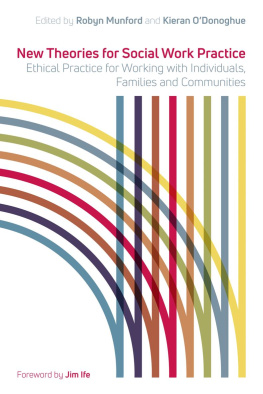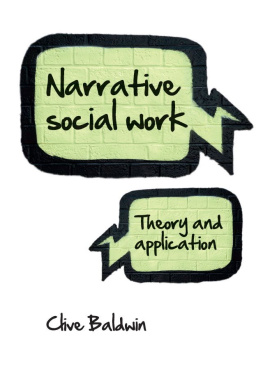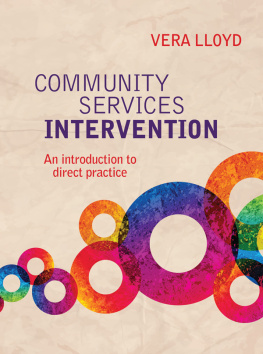Columbia University Press
Publishers Since 1893
New York Chichester, West Sussex
cup.columbia.edu
Copyright 2010 Columbia University Press
All rights reserved
E-ISBN 978-0-231-51933-5
Library of Congress Cataloging-in-Publication Data
Reshaping theory in contemporary social work : toward a critical pluralism in clinical practice / edited by William Borden.
p. cm.
Includes bibliographical references and index.
ISBN 978-0-231-14700-2 (cloth : alk. paper)
ISBN 978-0-231-14701-9 (pbk. : alk. paper)ISBN 978-0-231-51933-5 (e-book)
1. Social service. 2. Social work administration. I. Borden, William, 1954
HV40.R387 2010
361.301dc22
2009029433
A Columbia University Press E-book.
CUP would be pleased to hear about your reading experience with this e-book at .
References to Internet Web sites (URLs) were accurate at the time of writing. Neither the author nor Columbia University Press is responsible for URLs that may have expired or changed since the manuscript was prepared.
THIS VOLUME ORIGINATES in a conference on the role of theory in contemporary social work practice, sponsored by the School of Social Service Administration at the University of Chicago in May 2007. The participants, leading scholars and practitioners in the field, were asked to address emerging developments in clinical theory from the vantage point of their own scholarship, research, or practice. The ideas and concerns explored over the course of the conference have shaped the chapters in this volume.
I thank the contributors for their thought, care, and generosity of spirit in preparing their accounts, and I thank my colleagues who joined the contributors as participants in the conference, especially Marie Connolly, Sarah Gehlert, Bernece Simon, Sara Taber, and Edwina Uehara. Jeanne Marsh, dean of the School of Social Service Administration, remains steadfast in her support of intellectual life, and I thank her and my colleagues for their ongoing conversation and support of scholarship in all its varied forms. I would like to express my gratitude to James Clark, collaborator on many projects, whose passion for ideas and conversation through the years have deepened my understanding of crucial concerns explored in this volume. It has been a special pleasure to work with Lauren Dockett, our editor at Columbia University Press, who has provided encouragement and support over the course of the project. The volume is dedicated to Sharon Berlin, scholar, teacher, and practitioner, whose contributions to clinical theory over the last quarter-century continue to enrich the field.
WILLIAM BORDEN
WE MUST FIND A THEORY THAT WILL WORK; AND THAT MEANS SOMETHING EXTREMELY DIFFICULT; FOR OUR THEORY MUST MEDIATE BETWEEN ALL PREVIOUS TRUTHS AND CERTAIN NEW EXPERIENCES.
WILLIAM JAMES, LECTURE 6, PRAGMATISMS CONCEPTION OF TRUTH (1907, 76-91)
PLURALISM HAS BEEN an irrepressible feature of social work from the start of the profession. A divergent range of thinkers, intellectual traditions, and theoretical perspectives have shaped the course of practice, over the last century, and clinicians continue to make pragmatic use of ideas from a variety of sources. Even so, theoretical concerns receive surprisingly little consideration in the broader literature of the field as practitioners seek to strengthen the empirical foundations of the discipline and negotiate the demands of an applied profession. Theory is often marginalized in social work education as a result of perceived conflicts with the practical concerns of the profession; the emergence of generalist, skills-based courses of study, and the growing emphasis on evidence-based practice.
This volume reaffirms the place of theory in social work practice and shows how emerging perspectives enlarge ways of seeing, understanding, and acting over the course of psychosocial intervention. At root, as William James reminds us, theories are instruments, providing us with tools for critical thinking, methods for carrying out our work, and justifications for our actions. The following chapters, written by distinguished scholars and practitioners especially for this volume, engage a range of essential concerns in contemporary social work, reflecting the vitality, richness, and creativity of theorizing in our time. Social workers have centered on the concrete particularities of persons and lives in their theory making from the beginnings of the profession, remaining close to the richness of lived experience and the human contexts of vulnerability, need, and possibility. As we will see, the contributors are careful to connect ideas and experience through case reports and clinical illustrations, showing how we bring ideas to bear in the give-and-take of day-to-day practice, reflecting the play and place of theory in our ongoing efforts to provide care, foster personal growth, and work toward social change.
Although most social workers endorse eclecticism as their orientation to practice, there is little consideration of the ways in which clinicians integrate ideas and methods from differing perspectives over the course of intervention. In the opening chapter I introduce critical pluralism and pragmatism as orienting perspectives in comparative approaches to clinical theory, drawing on the philosophical thought of William James, and show how mastery of differing theoretical models, therapeutic languages, and modes of intervention strengthens eclectic and integrative approaches to psychosocial intervention. By way of illustration, I examine a case from four theoretical perspectives, encompassing psychodynamic, behavioral, cognitive, and humanistic lines of understanding, and consider the ways in which a pluralist approach enlarges explanatory systems and facilitates efforts to integrate concepts, empirical findings, and technical procedures from divergent points of view. I emphasize the crucial role of ongoing dialogue across the foundational schools of thought, grounded in the concrete particulars of the clinical situation, in attempts to strengthen critical perspectives and enrich theoretically informed, pragmatic approaches to practice.
, reviews the basic assumptions and therapeutic methods encompassed in classical models of cognitive psychotherapy, considering their strengths and limits, and outlines the integrative perspective she has developed for social work practice.
As Berlin explains, classical thinkers have tended to locate the origins of dysfunction within the person, emphasizing cognitive distortions and failing to consider the realities of social, cultural, and environmental conditions that perpetuate problems in functioning. Moving beyond the traditional focus on the inner life of the individual, Berlin provides a crucial reorientation of the cognitive perspective for social work practice, situating the person in the larger social surround of demands and opportunities, helping practitioners take more account of oppressive or depriving conditions in the outer world that shape personal meaning and behavior.
Drawing on recent developments in neuroscience, personality theory, social psychology, relational psychoanalysis, narrative studies, experiential psychotherapy, and framing perspectives in the social work tradition, Berlin has developed an integrative model of practice that enlarges conceptions of person-environment interaction and core elements in psychosocial intervention. While her reformulations emphasize social and environmental domains of concern, she preserves a focus on the person as an individual, strengthening connections among personality theory, social-psychological perspectives, and clinical practice.








